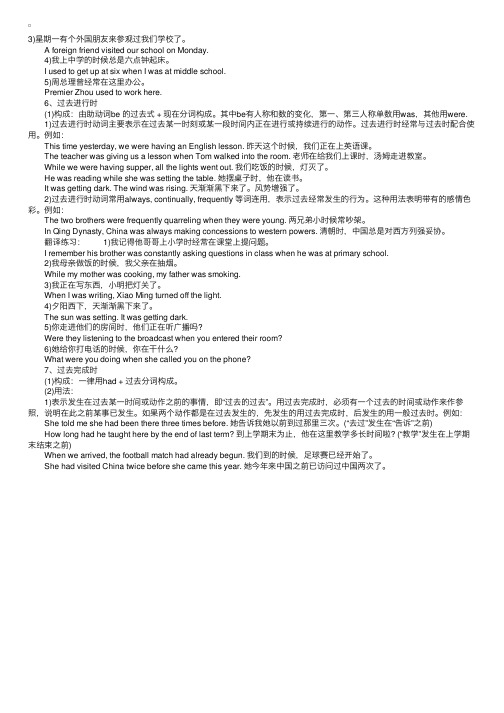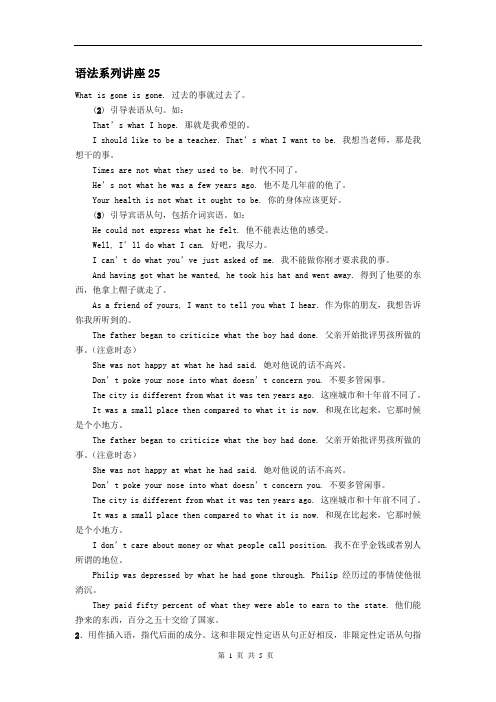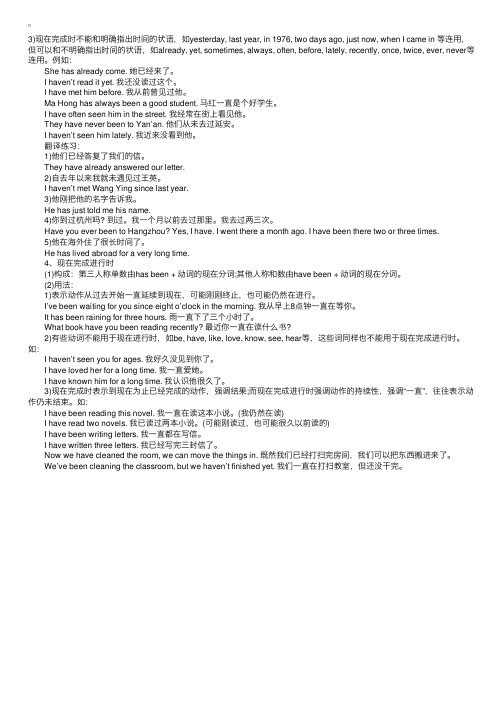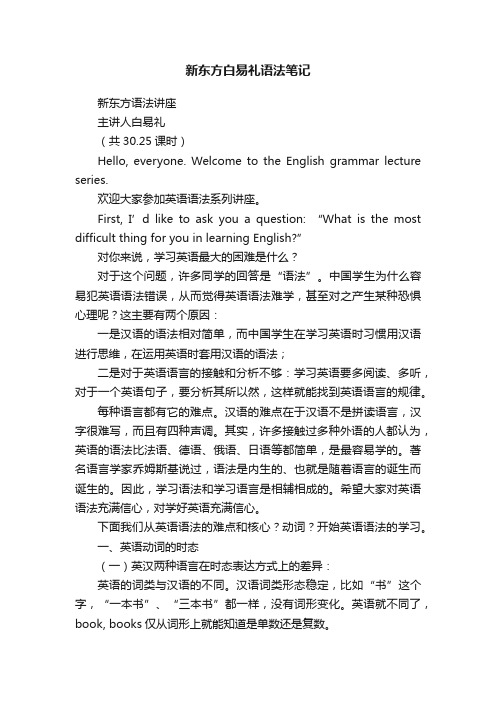新东方白易礼语法笔记8 (1)
Unit8笔记

Section A※Month There are 12 months in a year.1. months: 月份:January 一月 February二月 March三月 April四月 May五月 June六月 July七月August八月 September九月 October十月 November十一月 December十二月2. 基数词变序数词口诀:基变序,有规律,尾部要加-th。
一、二、三,特殊记,结尾字母t, d, d(one----first, two---second, three---third)八去t,九去e,ve要用f替(eight—eighth, nine—ninth, five—fifth, twelve—twelfth) ty变为tie,最后th加上去(twenty—twentieth, thirty—thirtieth)若是碰上几十几,只变个位就可以 (twenty-one---twenty-first, thirty-four—thirty-fourth)3. date of birth(出生日期)= birthday4. Happy+节日Happy birthday! 生日快乐!答语:Thanks./Thank you./Thanks a lot.Happy New Year! 答语:Happy New Year!/The same to you!5.问年龄用how old +be + + be + 基数词你多大了?我岁。
这个婴儿多大了?他10个月大。
1What’s sb.’s age【拓=数词+名词单数+...a 15-year-old girl 一个15岁的女孩 10-month-old boy【拓主语单数形式eg:is/are) a long time.【拓4】The old man is in old clothes,but the young girl is in new skirt.6. When is your birthday? 你的生日是什么时候?when疑问副词“什么时候”,引导特殊疑问句,句型“When+一般疑问句?”,回答用in/on/at等构成的表时间的介词短语eg:When is her birthday? Her birthday is on January 3rd.【辨析】when&what timewhen“什么时候”,可对年、月、日及时刻进行提问,也可询问某一动作发生的时间what time “几点”,询问具体时间,如几点几分【练】1. (When/What time)do you go to school?I go to school from Monday to Friday.2. (When/What time)do we have dinner,Mom?At 7:00.7.My birthday is on May 2nd.我的生日是5月2日。
新东方白易礼:英语四级考试语法笔记9

3)星期⼀有个外国朋友来参观过我们学校了。
A foreign friend visited our school on Monday. 4)我上中学的时候总是六点钟起床。
I used to get up at six when I was at middle school. 5)周总理曾经常在这⾥办公。
Premier Zhou used to work here. 6、过去进⾏时 (1)构成:由助动词be 的过去式 + 现在分词构成。
其中be有⼈称和数的变化,第⼀、第三⼈称单数⽤was,其他⽤were. 1)过去进⾏时动词主要表⽰在过去某⼀时刻或某⼀段时间内正在进⾏或持续进⾏的动作。
过去进⾏时经常与过去时配合使⽤。
例如: This time yesterday, we were having an English lesson. 昨天这个时候,我们正在上英语课。
The teacher was giving us a lesson when Tom walked into the room. ⽼师在给我们上课时,汤姆⾛进教室。
While we were having supper, all the lights went out. 我们吃饭的时候,灯灭了。
He was reading while she was setting the table. 她摆桌⼦时,他在读书。
It was getting dark. The wind was rising. 天渐渐⿊下来了。
风势增强了。
2)过去进⾏时动词常⽤always, continually, frequently 等词连⽤,表⽰过去经常发⽣的⾏为。
这种⽤法表明带有的感情⾊彩。
例如: The two brothers were frequently quarreling when they were young. 两兄弟⼩时候常吵架。
新东方白易礼语法笔记7 (1)

语法系列讲座22作从句的宾语。
关系代词在从句中作宾语时可以省略,因此上句又可变成“have you found the book you were looking for yesterday?”.请同学们照上面的例子,把下面变定语从句的步骤说出来(括号里的可以省略):( 1 ) "The dog belongs to the Browns. It ate my fish yesterday."……The dog which/that ate my fish yesterday belongs to the Browns。
(2) "The lady has gone to the police station. Her car has been stolen."……The lady whose car has been stolen has gone to the police station.(3) "I' ve seen the film. His girl friend played the leading role In it.''……I' ve seen the film {which / that) his girl friend played the leading role in……I’ve seen the film in which his girl friend played the leading role.……His girl friend played the leading role in the film {which/that) I’ve seen.关系副词与此同理。
只是关系副词代替的是原句中的状语。
在被代替之前,这个状语中一定要含有一个与另一句相同的成分。
例如:This is the house甲I was barn and brought up in the house.在这两个句子中,in the house是句子里的地点状语,定语从句修饰的就是the house。
新东方白易礼语法笔记9

语法系列讲座25What is gone is gone. 过去的事就过去了。
(2) 引导表语从句。
如:That’s what I hope. 那就是我希望的。
I should like to be a teacher. That’s what I want to be. 我想当老师,那是我想干的事。
Times are not what they used to be. 时代不同了。
He’s not what he was a few years ago. 他不是几年前的他了。
Your health is not what it ought to be. 你的身体应该更好。
(3) 引导宾语从句,包括介词宾语。
如:He could not express what he felt. 他不能表达他的感受。
Well, I’ll do what I can. 好吧,我尽力。
I can’t do what you’ve just asked of me. 我不能做你刚才要求我的事。
And having got what he wanted, he took his hat and went away. 得到了他要的东西,他拿上帽子就走了。
As a friend of yours, I want to tell you what I hear. 作为你的朋友,我想告诉你我所听到的。
The father began to criticize what the boy had done. 父亲开始批评男孩所做的事。
(注意时态)She was not happy at what he had said. 她对他说的话不高兴。
Don’t poke your nose into what doesn’t concern you. 不要多管闲事。
The city is different from what it was ten years ago. 这座城市和十年前不同了。
新东方白易礼:英语四级考试语法笔记7

3)现在完成时不能和明确指出时间的状语,如yesterday, last year, in 1976, two days ago, just now, when I came in 等连⽤,但可以和不明确指出时间的状语,如already, yet, sometimes, always, often, before, lately, recently, once, twice, ever, never等连⽤。
例如: She has already come. 她已经来了。
I haven’t read it yet. 我还没读过这个。
I have met him before. 我从前曾见过他。
Ma Hong has always been a good student. 马红⼀直是个好学⽣。
I have often seen him in the street. 我经常在街上看见他。
They have never been to Yan’an. 他们从未去过延安。
I haven’t seen him lately. 我近来没看到他。
翻译练习: 1)他们已经答复了我们的信。
They have already answered our letter. 2)⾃去年以来我就未遇见过王英。
I haven’t met Wang Ying since last year. 3)他刚把他的名字告诉我。
He has just told me his name. 4)你到过杭州吗? 到过。
我⼀个⽉以前去过那⾥。
我去过两三次。
Have you ever been to Hangzhou? Yes, I have. I went there a month ago. I have been there two or three times. 5)他在海外住了很长时间了。
He has lived abroad for a very long time. 4、现在完成进⾏时 (1)构成:第三⼈称单数由has been + 动词的现在分词;其他⼈称和数由have been + 动词的现在分词。
新东方白易礼语法笔记6 0

语法系列讲座20(6) 革命意味着解放生产力。
误:Revolution means to liberate the productive farces.正:Revolution means liberating the productive farces.析:mean后跟动词不定式表示“意欲/打算”,后面跟动名词表示“意味着”(7))他在看通知时有了一个主意。
误:When reading the notice, an idea came into his mind.正:When he was reading the notice, an idea came into his mind.正:Reading (When reading) the notice, he had an idea.析:分词的逻辑主语要与句子的主语一致(8)依据他的说法,这个答案是对的。
误:Judge from what he said, the answer is right.正:Judging from what he said, the answer is right.析:“Judging”在这里是插入语,作独立成分。
类似的用法还有to tell, the truth, considering, generally speaking等。
(9)我们尽快地走,希望及时赶到误:We walked as fast as we could to hope to get there in time.正:We walked as fast as we could, hoping to get there in time.析:根据句意,希望hope不表示目的,而表示伴随状况,所以用hoping.(10)这封需要马上回复。
误:The letter demanded answering immediately.正:The letter demanded an immediate answer.正:The letter required (needed) answering immediately.析:require,need,want作“需要”解时,可跟动名词做宾语。
新东方白易礼语法笔记12

当主句的have不表示“拥有”而表示其他意思时,附加疑问要用do,如:You had a cold yesterday, didn’t you?They don’t have coffee with breakfast, do they?8.There be句型的反意疑问句,用there 作主语。
如:There is something wrong, isn’t there?There won’t be any trouble, will there? 不会有任何麻烦,是吗?9.陈述部分的主语是everyone, someone, anyone, no one, nobody等不定代词时,其疑问部分的主语可用he, 也可用they.如:Everyone knows it, doesn’t he/don’t they?英语反意疑问句的回答有点和汉语的相反。
但一定要记住:只要回答是肯定的,都用yes,只要回答是否定的,都用no。
这在主句是否定句的时候要特别注意。
例如:Mr. Jones can’t speak French, can he? ?No, he can’t.琼斯先生不会讲法语,对吗??对,他不会讲法语。
Mr. Jones can’t speak French, can he? ?Yes, he can.琼斯先生不会讲法语,对吗??不,他会讲法语。
This is not a door, is it? -Yes, it is. It is an iron door.这不是门,对吗??不,这是门。
是扇铁门。
练习完成下列反意疑问句,并译出后面的回答。
1)There is a dog under the tree, _____? 是的,有。
→isn’t there? Yes, there is.2)They are laughing at me, ____? 不,没有。
/ 对,是的。
→aren’t they? No, they aren’t. / Yes, they are.3)We haven’t visited that college, _____? 对,还没有。
新东方白易礼语法笔记

新东方白易礼语法笔记新东方语法讲座主讲人白易礼(共30.25课时)Hello, everyone. Welcome to the English grammar lecture series.欢迎大家参加英语语法系列讲座。
First, I’d like to ask you a question: “What is the most difficult thing for you in learning English?”对你来说,学习英语最大的困难是什么?对于这个问题,许多同学的回答是“语法”。
中国学生为什么容易犯英语语法错误,从而觉得英语语法难学,甚至对之产生某种恐惧心理呢?这主要有两个原因:一是汉语的语法相对简单,而中国学生在学习英语时习惯用汉语进行思维,在运用英语时套用汉语的语法;二是对于英语语言的接触和分析不够:学习英语要多阅读、多听,对于一个英语句子,要分析其所以然,这样就能找到英语语言的规律。
每种语言都有它的难点。
汉语的难点在于汉语不是拼读语言,汉字很难写,而且有四种声调。
其实,许多接触过多种外语的人都认为,英语的语法比法语、德语、俄语、日语等都简单,是最容易学的。
著名语言学家乔姆斯基说过,语法是内生的、也就是随着语言的诞生而诞生的。
因此,学习语法和学习语言是相辅相成的。
希望大家对英语语法充满信心,对学好英语充满信心。
下面我们从英语语法的难点和核心?动词?开始英语语法的学习。
一、英语动词的时态(一)英汉两种语言在时态表达方式上的差异:英语的词类与汉语的不同。
汉语词类形态稳定,比如“书”这个字,“一本书”、“三本书”都一样,没有词形变化。
英语就不同了,book, books仅从词形上就能知道是单数还是复数。
动词是英语中变化最多、最复杂的词类。
有人说,学好英语就是学好动词,此言甚是。
同一个动作或状态分别在不同时间发生或存在,表达这个动作或状态的动词就要用不同的形式,这就是时态。
例如:在“中国是个伟大的国家。
- 1、下载文档前请自行甄别文档内容的完整性,平台不提供额外的编辑、内容补充、找答案等附加服务。
- 2、"仅部分预览"的文档,不可在线预览部分如存在完整性等问题,可反馈申请退款(可完整预览的文档不适用该条件!)。
- 3、如文档侵犯您的权益,请联系客服反馈,我们会尽快为您处理(人工客服工作时间:9:00-18:30)。
语法系列讲座23如:Peter is the one who everybody believes will fail to bring off the contract. Peter 是那个人人都认为不能完成合同的人。
(everybody believes 是插入语)At the election I voted for the man whom I believed to be the most suitable.在选举的时候我投了我认为最合适的那个人的票。
5.关系代词作从句的主语时,从句的动词必须和先行词的人称和数一致:例:These are the operating instructions that/which are written in English 。
这就是用英文写成的使用说明。
Are you staying at the white house which/that is newly completed and which /that has 15 bedrooms, 3 kitchens and 4 toilets?你是住在那幢刚刚竣工、有15个卧室、3个病房和4个卫生间的白色房子里吗?So far as I know, there are many VIPs who are going to attend the reception.就我所知有很多达官贵人将出席这个招待会。
6.非限定性定语从句不用that,只用who(whose, whom)和which代表人和物;例:Her brothers, both of whom work in America, ring her up every week。
她的兄弟们??两个人都在美国工作??每个星期都给她打电话。
The buses, most of which were already full, were surrounded by an angry crowd,那些公共汽车??大多已经坐满了人??被一群愤怒的人围着。
That tower block, which cost five million dollars to build, has been empty for five years.那个塔楼空着已经5年了。
建它花了500万美元。
Cricket, which I know very little about, is a very popular sport in England。
板球是英格兰非常流行的体育活动,我对它知之甚少。
The accounts of the company ,which I’ve been paying great attention to, are in balance.公司的账目是保持平衡的。
我一直非常注意这些账目。
例:I shall never forget the day when (=on which) we first met.我永远也不会忘记我们第一次见面的那一天。
The rain came at a time when (=at which) it was not needed.雨下得不是时候。
This is the computer where (=by/on which) he has stolen top-secret documents.这就是他用来盗窃绝密文件的计算机。
Here is the place where (=at which) the murder took place.这就是谋杀发生的地方。
He didn’t give any reason why (=for which) I had been fired.他没给任何解雇我的理由This is the house in which (=where) my parents used to live.这就是我父母以前住过的房子。
注意事项:(1)在非正式场合, that有时可用来代替关系副词或相当于关系副词的“介词+which”,而且经常全部省略,如:In all the years that (=when/during which) I was at collage在我读大学的那些年里the reason that(=why/for which)he is not happy他不高兴的理由The direction(that)(=in which )the heavenly bodies move can’t be changed.天体运行的方向是不可改变的。
He is unpopular because people don’t like the offensive way (that)(=in which) he talks.他不受欢迎的原因是他说话的方式让人讨厌。
(2)是用关系代词还是用关系副词:关系词(包括关系代词和关系副词)是学习英语定语从句的关键。
用关系代词还是用关系副词,一要看关系词在从句当中作什么成分;二要看关系词所代表的是人、物、时间、地点还是原因;三要看所引导的是限定性定语从句还是非限定性定语从句。
所以同样的先行词会有不同的关系词,这是因为关系词在从句当中担当的作用不同而决定的。
如:This is the room where/in which we’ll celebrate the New Year.这是我们将要在里面庆贺新年的房间。
(充当地点状语)This is the room(that /which)we’ll celebrate the New Year in.这是我们将要在里面庆贺新年的房间。
(充当介词宾语,可省略。
)This is the room which /that will be used for the celebration of the New Year.这是那个将要被用来庆贺新年的房间。
(充当主语)This is the room (which/that) we’ll use for the New Year dinner party.这是我们将要用来举行新年晚宴的房间。
(充当宾语,可省略。
)The reason (that /which) he had given was not sound enough.他给的理由不够充分。
(充当宾语,可省略)The reason why/for which he had done that was not sound enough.他做那件事的理由不够充分。
(充当原因状语)This is the house where she lives.这是她住的房子。
【比较:This is the house (that/which) she has bought. 这是她买的房子。
This isthe house that/which I’ve told you is extremely expensive.这就是我和你说过极其昂贵的那幢房子。
】I met him in t he year when I was first in Xi’an.我刚到西安的那年遇到了他。
That is the reason why he did not come that morning.那就是那天上午他没来的原因。
(3)定语从句中的时态。
如果主句是一般将来时或过去将来时,从句的动作与主句的同时发生,那么该从句要用一般现在时表示一般将来时、用一般过去时表示过去将来时。
例:Anyone who/that touches the wire will get an electric shock.任何碰这根电线的人将受到电击。
(不用will touch)I would give her anything that she asked for.她要什么我就给她什么。
(不用would ask)The first person who/that opens the door will get a shock.第一个开门的人将被吓一跳。
(不用will open)There will be a special price for anybody who orders a suit in the next two weeks.任何人在下两周内定做套装都将享受优惠价格。
(不用will order)但是,如果从句和主句的动作在将来不同的时间发生,则两部分都要用来将来时,如:Those who will go abroad for training next year will start learning English tomorrow.那些明年出国受训的人员,将从明天开始学习外语。
注:①先行词有最高级形容词修饰时,常用that,而不用which:例:Edison was one of the greatest inventors that ever lived.爱迪生是曾经有过的最伟大的发明家之一。
This is the best film that I’ve ever seen.这是我曾经看过的最好的电影。
She was the greatest woman that/who has ever lived.她是曾经有过的最伟大的女人。
②先行词有the same, the very, the first, the last, all, no, the only, much, little, none, any, every等时,常用that, 而不用which:例:He was the first man that we saw in the village.他是我们在那个村子里看到的第一个人。
There is little that is interesting.没什么令人感兴趣。
I still remember the first time that we met.我仍然记得我们第一次见面的时候。
I’ll do anything (that) I can to help you.我将尽一切可能帮助你。
Everything that can be done has been done.能做的一切都做了。
God bless this ship and all who sail in her.愿上帝保佑此船和所有乘此船航行的人。
All that I can say is thank you very much.我能说的是(千言万语变成一句话):非常感谢你。
③当先行词既有人又有物时,用that,不用which,如:We were deeply impressed by the workers and their working conditions that we had visited.我们参观过的工人及他们的工作条件留下了深刻印象。
